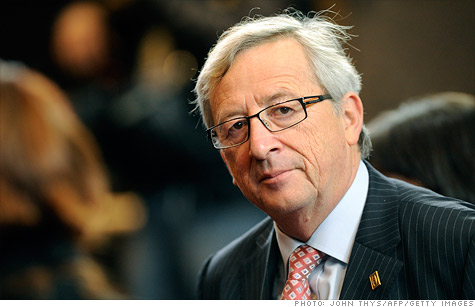
Jean-Claude Juncker, the Luxembourg politician who heads the Eurogroup of finance ministers, backed a plan to boost the euro area?s bailout resources.
NEW YORK (CNNMoney) -- Euro-area finance ministers agreed Friday to expand their financial firewall to €700 billion by combining the resources of two bailout funds.
Under the agreement, bailout programs worth a combined €200 billion for Greece, Ireland and Portugal will continue to be financed by the temporary European Financial Stability Facility (EFSF).
This will enable a permanent fund, called the European Stability Mechanism (ESM), to reach its full lending capacity of €500 billion. The €200 billion in existing bailouts was originally set to be rolled into the ESM, which comes into effect in July.
Taken together, the "overall ceiling" for the combined funds will be "raised" to €700 billion, the ministers said in a joint statement.
Greek debt swap just one more step, not the solution
In addition, the EFSF will be able to fund new programs during a "transitional period" through mid-2013 while the ESM set up, according to the statement.
Once the transitional period is complete, the ESM's lending capacity will be set at €500 billion, although the combined resources will remain at €700 billion.
Including another €102 billion worth of bailout funds that have already been paid out to Greece and other countries, the ministers said the overall firewall is worth about €800 billion, or $1 trillion.
"Finally, robust firewalls have been established," the statement said. "This comprehensive strategy has paid off and led to a significant improvement of market conditions."
G-20 chiefs: Europe needs a bigger financial firewall
However, the €700 billion in overall bailout funds falls short of the €1 trillion firewall that has been called for by the International Monetary Fund and members of the Group of 20 economic powers.
The G-20 said earlier this year that euro-area officials need to build a "strong and credible" firewall before the group will consider boosting IMF resources.
The IMF is seeking to raise $500 billion to meet an estimated $1 trillion in funding needs over the next few years.
Euro-area governments have already pledged to provide €150 billion, or about $200 billion, worth of "bilateral loans" to the IMF. But the United States, the largest IMF backer, has made clear that the fund's resources are sufficient.
No comments:
Post a Comment